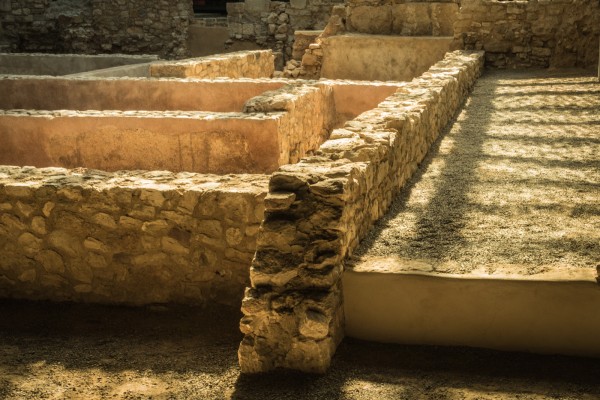Valentia Edetanorum is the city nowadays named València in Spain, which origins date back to the Ancient Roman age.
These archeological remains were unknown, hidden underground in the modern València, until 1985, when extension works of the Basilica de la Virgen started and the ruins were found, so by pure chance. Of course the works of the Basilica were cancelled, and during years the remains of Roman, Visigothic and Islamic ruins were being excavated. Once the archaeologists finished, the dig was converted into a museum inaugurated in 2007, the Almoina Archaeological Centre, where I took these photos.

Now a bit of history. Valentia Edetanorum was founded by the Roman military commander and consul Decimus Junius Brutus Callaicus in the year 138 BC, when he licensed his troops after some military campaigns in Hispania and granted them lands, as reward, in this region. Valentia means ‘valour’ in Latin (in honour of the valour of the Roman soldiers), and Edetanorum means ‘in the Edetania region’.

However, the original Roman village only stayed 63 years. In the Roman civil war between Marians and Sullans, Valentia (in the losing side, the Marians) was destroyed in the year 75 BC by the renowned general Gnaeus Pompeius Magnus (Pompey the Great). Valentia remained in ruins and uninhabited during the next 50 years. Meanwhile, Pompeius took part in another civil war, against Julius Caesar, being defeated, murdered and beheaded in 48 BC, the day after his 57th birthday. The karma? His head was delivered to Julius Caesar a few days later.
Let us come back to the founder of Valentia Edetanorum, Decimus Junius Brutus Callaicus. Years later, his family (gens Junia) played an important role in Rome’s history, with two participants in the assassination of Julius Caesar (44 BC, 15 March). One was Decimus Junius Brutus Albinus, grandson of Callaicus; and the other was Marcus Junius Brutus (the famous Brutus, the one of the “You too, Brutus?”), who was a distant cousin of Albinus. It’s a small world!






Very interesting part of history! Saludos 🙂
LikeLiked by 1 person
Thank you Barbara, saludos 🙂
LikeLiked by 1 person
Great information Samuel, great pics! That is an interesting museum behind the Basilica
LikeLiked by 1 person
Thanks Francisco. Yes, it’s worth to visit this museum.
About the information, it’s curious that the founder of the city is very unknown here. History didn’t start with Jaume I!
LikeLiked by 1 person
You are absolutely right! Thanks for such a great post that brings that history to light about Valencia.
LikeLiked by 1 person
Thank you Francisco
LikeLiked by 1 person
De res
LikeLiked by 1 person
Nice write up about the pictures. I really want to spend a month or two in Spain. Such a beautiful & amazing country.
LikeLiked by 1 person
Thanks for your comment. And yes, there is a lot to see here, one can be months visiting different places here.
LikeLiked by 1 person